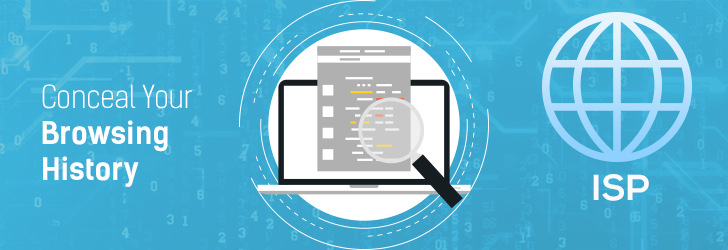
Stop Internet Service Providers from tracking your online activities.
If you're in the US, you may know that the recent repeal of the FCC's online net neutrality rules means that your Internet Service Provider (ISP) can sell your web history to outside parties. You’ll likely have no idea who these third parties are and what they’re doing with your data.
If you’d prefer to keep your browsing details private, there are options you can pursue to conceal your data from ISPs.
What Kind of Data Can My ISP Collect?
An ISP provides you with access to the Internet. Since they’re your only gateway to the online world, you don’t have much choice about what they monitor, store, and collect about their users.
By tracking your IP address, your ISP can record every website you visit and have already visited through your browsing history. They can also monitor different habits such as what hours you’re most active, where you are when connecting to the Internet and what device you are connecting on. Moreover, 100% of all unencrypted data that is transmitted through the Internet can be tracked by your ISP.
With all the information ISPs collect, they have the ability to make a lot of money. Using this, they can sell the data to interested third parties to use any way they see fit. Furthermore, there is no way of telling who your data is being purchased by. This information can be used by third parties for:
- Targeted Advertisements
- Distribution of Personal Data
- Installing Spyware
- Undetectable Cookies
- How to Hide Your Browsing History
Parties are able to Insert targeted ads based on your browsing history. For example, if you search for a new pair of shoes, you’ll likely see targeted ads on other websites showing sales and links for all types of shoes.
This information, such as name, address, phone number, email, can be dangerous in the wrong hands. Regardless of what you are doing on the Internet, third parties can know everything about your private life, whether you want them to or not.
Third parties and ISPs have been known to install spyware on user devices. This gives them full access to phone calls, messages, pictures and anything else you do on your personal device.
By tracking what sites you visit, third parties can learn the personal preferences of their users. This information can be used to send you unwanted information in the form of ads, emails, texts and notifications on your device.
Many people are concerned about personal data ISP's obtaining, considering it an invasion of privacy. If you’d like to overcome this issue and hide your browsing history not only from ISPs, but anyone that is trying to access your data, here are a few ways to consider:
Use HTTPS Everywhere
Websites beginning with HTTPS offer a “secure” connection rather than HTTP which is not secure. The padlock symbol that appears next to the URL clarifies that the website is encrypting your data transmitted on the site. The Electronic Frontier Foundation offers HTTPS Everywhere, a browser extension which encrypts your information on sites that are only HTTP (insecure) - if the website supports HTTPS. However, this only encrypts your data on the site, not everything before and after. So your ISP may still see that you visited Twitter, they just can’t see your feed when you’re connected to the site.
Use Tor
The Tor Browser encrypts your traffic and prevents ISPs, and anyone else, from tracking your online activities. The browser offers complete anonymity, allowing users to even dabble in the dark web. However, many consider the browser to be quite complicated and less convenient than other options such as a VPN.
Here are few things to consider when using Tor:
- Tor only protects the information you send over the Tor browser.
- The browser isn’t compatible with sites that use CloudFlare security software (which most sites use).
- Using Tor can be especially suspicious in the eyes of government agencies such as the NSA regardless of your intentions.
- You may notice a decrease in your Internet speed depending on the route of your Tor traffic.
- Nearly every time you enter a new domain, you will be prompted with a security captcha to ensure you are not a robot. Although this is a minor inconvenience, it does help improve security.
Use a Paid Virtual Private Network
A Virtual Private Network (VPN) lets you virtually change your IP address and encrypts your transmitted data. This allows you to conceal your browsing history from your ISP.
If you’re actually looking to get around ISP monitoring, you should find a VPN that offers a no log privacy policy, encrypts all of your data, and even offers extra options such as an Internet kill switch and automatic Wi-Fi security.
Keep in mind, while free VPNs exist, you should never trust a free service to ensure privacy. Know that these VPNs are making money somehow, and it’s likely off of selling your personal data. Additionally, VPNs are a great alternative to Tor if you’d like to avoid becoming a suspicious target of authorities.
Is My IP Address Public?
If you’re curious what can be seen using your device online, check out iplocation.net. If you’ve already chosen a method to conceal your browsing history from your ISP, you can also use the site before and after connecting to your preferred service to determine if your personal data has been hidden.
Share this post
Leave a comment
All comments are moderated. Spammy and bot submitted comments are deleted. Please submit the comments that are helpful to others, and we'll approve your comments. A comment that includes outbound link will only be approved if the content is relevant to the topic, and has some value to our readers.

Comments (0)
No comment